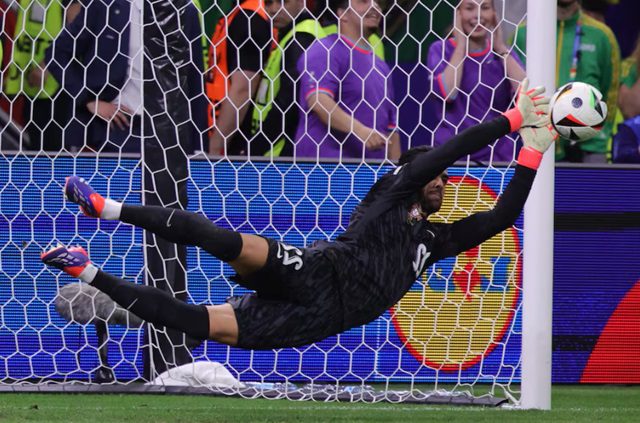BTN News: Diogo Costa did not show signs of becoming a penalty shootout hero in Euro Cup history. Before his amazing feat, before stopping three penalties in a single shootout—a first in the tournament—Costa had faced penalty rounds before but had not made a big impact. His latest attempt was just three and a half months ago at Emirates Stadium.
The Champions League Round of 16 Experience at Emirates Stadium Left a Mark on Diogo Costa
During the second leg of the Champions League round of 16, Arsenal came back from a 1-0 loss in Porto. Diogo Costa watched as Martin Odegaard, Kai Havertz, Bukayo Saka, and Declan Rice took their penalties. He could not save any, while David Raya saved two, helping the English team advance. When Costa joined the Portuguese team in Harsewinkel, that penalty shootout was still a topic, as his coach Roberto Martínez mentioned after Costa’s incredible performance. “We talked about his experience against Arsenal. His experiences and maturity helped us today,” Martínez explained. “Diogo used his heart and feelings, and he grew a lot. He is a great goalkeeper, the secret of Portuguese football that came out today.”
Diogo Costa’s Heroics Bring Relief to Cristiano Ronaldo and Tears of Joy to Himself
Costa’s actions comforted Cristiano Ronaldo, and after that, the Swiss-born goalkeeper, 24, from Rothrist, also cried during his first TV interviews. His tears, however, were of happiness and relief. He had faced at least one other penalty shootout with Portugal, eight years earlier in the Under-17 European Championship final against Spain. He didn’t save any penalties then either, but his team won after Manu Morlanes hit the post. The success in Frankfurt seemed almost unexplainable to him: “We always study, but I didn’t focus much on the analysis. It was instinct. I can’t explain it; goalkeepers need that, and thank God it worked,” said Costa, who has been with Porto’s academy since he was 11.
Diogo Costa Wins Best Player Trophy and Shares Thoughts on the Match and Shootout
After his TV appearances on the field, Costa came to the Frankfurt Arena press room with the trophy for the best player of the match. He placed it on the table to his right and smiled at the audience—a calm smile, like he had just achieved something great. He talked not only about the three penalties he saved but also about the moment that led Portugal to the shootout. In the second half of extra time, Sesko broke away from Pepe and raced towards him: “These are the hardest matches because we don’t touch the ball much, so I focused on every chance. I put all my energy into it. I thought: ‘I have to save it.’ I did my best… I tried to read his body to see where he was going to shoot, and thank God I could stop it.” He stretched his left foot, like Emi Martinez against Kolo Muani in the World Cup final in Qatar, and sent the game to the penalty spot. “Maybe this is the match of my life, where I helped the team the most.”
Diogo Costa Reflects on His Performance and Acknowledges the Importance of Hard Work and Belief
Even then, sitting down, Costa couldn’t explain how he had done what no one else had: “I focused as much as I could, took a deep breath, and followed my instinct,” he said. “But the most important thing is hard work. I work hard and trust myself a lot.”
He was also happy to have helped Cristiano Ronaldo, who had missed a penalty in the first half of extra time that could have decided the match: “We had to keep believing. Everyone, Cris, me, everyone makes mistakes, but what matters is what we do after. We have to believe, and that’s what we did,” he said. “I understand his frustration because he spends a lot of time preparing. It’s a pleasure to play with him.”
With a happy smile, Costa stood up, nearly forgetting the MVP trophy on the table. Reminded of it as he reached the door, he returned for the unexpected award and left, still feeling overjoyed.


